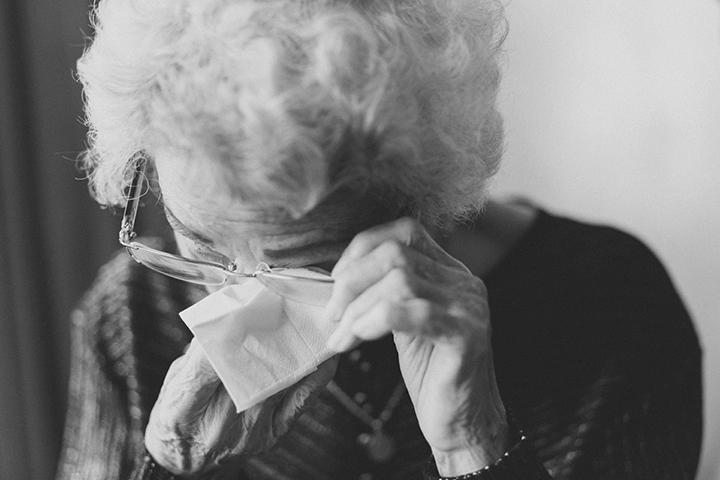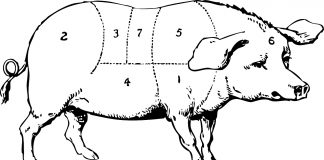| Issue #80 • March/April, 2003 |
“Why’d you shoot me, bitch?”
Last words of home invader Shaarod Profitt, September 18, 1998.
It was a cool fall evening in Little Rock, Arkansas, when Don Mosely heard the storm door rattling. Thinking his brother was outside, the sixty-year-old disabled homeowner walked to the door and opened it.
A masked man stood on the porch. He wore dark clothes and a black stocking mask knotted at the top. Holes had been cut out for his eyes and mouth. “Just like you see on television,” Mosely later recalled.
He had little time to react.
The man pointed a gun at Mosely and demanded, “Gimme your car keys!”
When Mosely didn’t respond, the assailant raised the barrel of the gun and stuck it in the homeowner’s face.
“Gimme your keys!” he ordered again.
In a recent interview, Mosely recalled, “He had a .22-caliber Marlin semiautomatic rifle. He’d cut the stock off and made it into a pistol-grip. I grabbed the barrel of the gun and his first shot hit the door-facing. We wrestled around and I almost got it away from him. But he ended up shooting me.”
Doctors later determined that the bullet, which had been fired point-blank into his stomach, had careened down into Mosely’s right thigh. Although he felt little pain, his leg went numb, and he fell to the floor.
The suddenness of the attack stunned Mosely. He decided to play dead, hoping the intruder wouldn’t shoot him again.
Lying still, he thought of the gun he’d hidden beside his chair. If he could get to it, he might be able to stop the assailant.
Just moments before the stranger had appeared at their door, Mosely and his wife, Jane, had returned home after dining at a local restaurant with Don’s brother. While Don settled down in his rocker, Jane grabbed a bowl of cereal from the kitchen and walked back into the bedroom.
When he heard the door rattling, Don assumed it was his brother coming back to the house to pick up something he’d left.
Don and Jane Mosely had lived in the comfortable home on Richland Drive for thirty-nine years. The couple had raised their children there, but their memories belied today’s reality. In the last few years, they’d watched helplessly as the neighborhood had changed. Now gang members lurked on street corners selling drugs and looking for trouble. Neighbors who used to wave or stop to chat now quickly disappeared into their own residences.
Even though times had changed, Jane, who was known by the children in the community as “Mom,” still provided candy and cakes as treats to the neighborhood children. She always had a ready smile for those trapped in the bleak surroundings.
Now the thug stood over Don Mosely, as if deciding whether to shoot again.
At that moment, Mosely heard a thud in the bedroom.
The intruder also heard it and suddenly sprinted away. Don raised his head and saw the man disappear down the hall.
He was headed straight toward the bedroom!
Oh my God, he thought. This guy’s gonna kill my wife.
Mosely pulled himself to his feet. But he fell when he tried to walk. He stood again. After a few moments, he found that if he dragged his leg behind him, he could maneuver enough to get around.
He was surprised he wasn’t bleeding more. A smear of blood about the size of a silver dollar spotted the floor where he’d lain.
“I had a little American Arms .22-caliber Magnum revolver,” he said. “It was sitting beside my chair. I picked it up, but my leg wouldn’t work very well. Before I could get all the way back there, I could already hear them shooting.”
Jane Mosely had been sitting on the edge of the bed eating her cereal. She’d turned on the television and placed the telephone beside her. When she heard Don get up and go to the door, she also thought that her husband’s brother had returned.
“But when I heard a stranger’s voice at the door, I knew something was wrong,” Jane recalled in a recent interview. “So I picked up the phone and dialed 911. Then I heard the shots and heard my husband moan. I thought he was dead. That’s when I crossed the room to get my gun out of the closet.”
The couple usually kept their .32-caliber Smith & Wesson snub-nosed revolver beside the bed. But because their grandchildren had been visiting recently, Jane had placed it on a shelf in the closet.
She figured it would only be a matter of time before the intruder headed for the bedroom.
After retrieving the gun, Jane sought refuge behind a chest of drawers in the back corner of the room. It seemed to offer at least some protection.
Jane muttered a quick prayer and waited for the gunman to appear. Crouched behind the chest of drawers, she followed his shadow as it moved across the doorway.
His appearance startled her. With his black mask, his dark clothes, and lithe figure, he reminded her of a ninja warrior.
Then she saw the gun.
She was still talking to the dispatcher when he entered the room. But as soon as she saw him, Jane threw the phone on the floor. She later learned that the entire gunfight had been recorded on the 911 tape.
The masked intruder edged cautiously into the room.
As soon as he saw Jane, he fired.
The shot slammed into the chest of drawers, causing the housewife to flinch.
Jane recalled, “He had to come pretty far into the room to be able to shoot me because I was backed up in the corner and had some protection from the chest of drawers. When he saw me, he spun around and aimed his gun at me. Then we both started shooting at each other. Police later said he fired eleven shots. I don’t have any recollection of how many shots I fired. I don’t remember when I was hit in the arm, but I did feel the bullet that hit me in the groin.”
She aimed at his head and pressed the trigger. The blast deafened her.
The small bedroom had become a war zone. The gunman’s volleys thudded into the wall behind her. A television that sat on the chest of drawers took a direct hitthe glass shattered, stinging her face. The intruder continued to move toward Jane, still shooting.
The first time she was hit, Jane felt panic surge up inside her. But she knew she had to remain calm. She fired again, and continued to pull the trigger until the gun no longer fired.
Jane remembered, “He kept coming closer and closer, firing all the time. There was a little stool in front of the dresser, and he crouched behind that stool. He was constantly raising up and shooting at me.”
By now, Jane’s revolver was empty. She continued squeezing the trigger, only to hear it clicking into an empty chamber.
She was bleeding, and the pain in her abdomen was excruciating.
Now her assailant was just a few feet away. She could see that she had hit him at least twiceblood pumped from an open wound to his throat, and his mask had turned crimson.
He held the rifle as if it were a pistol. It was then that, like her husband, she noticed the stock had been cut off and carved into a pistol-grip.
The man seemed determined to kill her, like some madman in a cheap stalker movie. She was bleeding heavily. If I get shot again, Jane thought, I’m dead.
By now, the gunman had closed the distance to less than a foot. In desperation, Jane flung her empty gun to the floor, and grabbed the barrel of his rifle.
The gunman tried to wrench it away, and the two combatants fell to the floor. He landed on top of her and somehow squeezed off another round. The bullet missed Jane and plowed into the floor. The assailant attempted to twist the barrel into her torso so that he could shoot her again, but the fear of dying drove her to push it away.
The struggle lasted for about two minutes. But it seemed like forever to Jane Mosely.
She thought of her children.
I will not die, she thought. I will survive.
Don Mosely later recalled the horrific scene he saw when he entered the bedroom.
“When I got back there,” he said, “[the gunman] and my wife were on the floor in the damndest puddle of blood you’ve ever seen. They were struggling for the gunhe kept trying to point the barrel towards my wife, and she kept pushing it back.”
The stool had been knocked to the floor and a lamp had shattered. Bullet holes dotted the walls, and splinters of wood from the chest of drawers lay on the floor.
But what struck Mosely was the complete silence as the two fought desperately for the gun.
He dragged his lame leg toward them, using the bedpost to help steady himself.
By now the gunman was straddling Jane. She lay on her back, still holding onto the sawed-off rifle.
When Don Mosely was less than a foot from the assailant, he placed the pistol against the man’s head.
At point-blank range, the homeowner pulled the trigger. At the crack of the gunshot, the invader dropped to his knees. He loosened his grip on the rifle, allowing Jane to wrench it from him.
Don cocked the gun and fired again. The man’s body went limp, and he collapsed to the floor.
Jane Mosely lay in the corner of the room where she’d made her stand. Her dress was stained crimson, and now her body ached all over. But she was jubilant to see that her husband had survived.
The gunman lay beside her, gasping. Blood still pumped out of the wound to his neck.
Don Mosley recalled, “I grabbed his gun and threw it up on the bed. Then I picked up the phone, and told the dispatcher we’d both been shot.”
Blood from Jane and the intruder flowed to form a pool on the floor.
She thought the masked man was dead. But he slowly raised his head. Twisting toward Jane, he asked, “Why’d you shoot me, bitch?” They were the last words Shaarod Profitt ever said.
Jane later recalled that she was incredulous that he would ask such question. Although she didn’t respond, she thought, why do you think I shot you?
Police had been instructed by dispatchers to treat the call as a domestic disturbance. Don Mosely, standing in the hall, still held his gun when the first officers arrived. He was ordered to put his weapon down, then he was forced to the floor and handcuffed.
Investigators at the scene quickly determined what had happened. The handcuffs were removed, and Don Mosely was examined by paramedics. Unlike the gunman and his wife, he’d bled very little.
The wounded homeowners were placed on stretchers and rushed to local hospitals. Both Jane Mosely and the intruder, identified as teenager Shaarod Profitt, were transported to Baptist Hospital, while Don was sent to University Hospital.
During exploratory surgery, Don developed a staph infection and had to be hospitalized several times before recuperating. Jane Mosely spent five days in the hospital, but eventually recovered completely.
Shaarod Profitt died the following day.
After a lengthy investigation, police arrested a second suspect, Tyrone Cooper, and charged him with being an accomplice. Through interviews with Cooper and other witnesses, investigators put together the following sequence of events that led to the foiled home invasion.
Profitt, Cooper, and an unidentified gang member had seen Don Mosely driving a new Chrysler LHS and decided to steal it.
Dressed in dark clothing and masks, they walked up the porch. Just as they were about to kick the door in, Don Mosely opened it. Almost immediately, he began to fight for his life with the gunman. Profitt’s accomplices fled as soon as the first shot was fired.
A neighbor had seen the strange trio walk up onto the steps to the Mosely home and called police. The witness recognized Profitt and Cooper but not the third robber.
Witnesses pointed out to police a house that Cooper had entered and he was quickly arrested. A mask, duct tape, and knife were found in a yard nearby.
He later plea-bargained a sentence of twenty-five years in prison. By law, Cooper must serve all of his sentence without the possibility of parole.
Not surprisingly, Don and Jane Mosely take gun ownership seriously. In a recent interview, Jane said, “I think everybody ought to be able to own guns and I don’t think people should be forced to put trigger locks on them. I know if there had been one on the gun I used, I wouldn’t be here. I’m also against having to register your guns. I just think they’re taking too much of our freedom away. [Our family has] always had guns, and we taught our children how to use guns safely.”
She paused, and said, “Thank God we knew how to protect ourselves.”
Don concurred. “My wife and I used to go out every weekend and target practice with handguns,” he said. He states that he believes the Federal and state governments do not have the right to pass gun control legislation.
Don also has his own theory about why he and Jane were shot.
“If [Profitt] didn’t intend to kill us,” he said, “why didn’t he leave after shooting me instead of going back to the bedroom after my wife? They planned to kill both of us to get the car. It might have even been a gang initiation. But I know he came in here with murder on his mind.”
Both Don and Jane Mosely agree that had they not owned firearms they would both be dead. And they wonder how many other victims would have died at the hands of Profitt and Cooper had they been allowed to continue their lives of crime.
Don and Jane Mosley recently moved to a new neighborhood to be closer to their children and grandchildren. They feel safe there. But they still keep their guns ready. Just in case.














